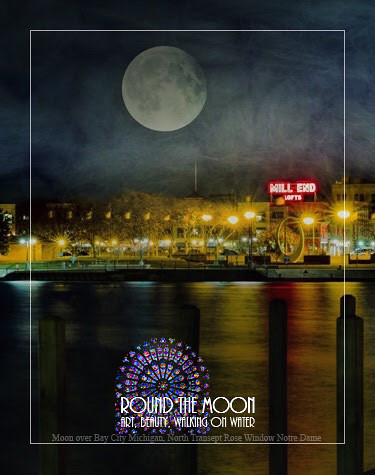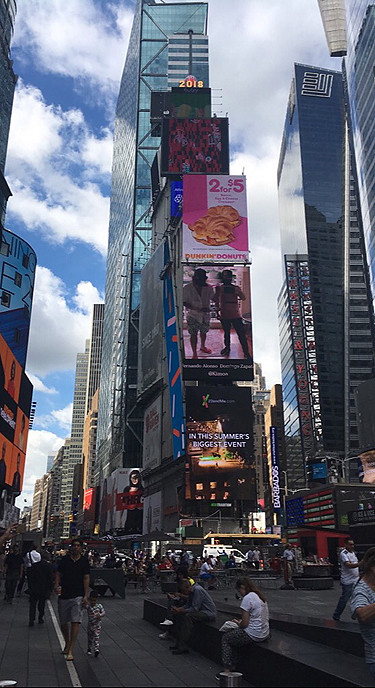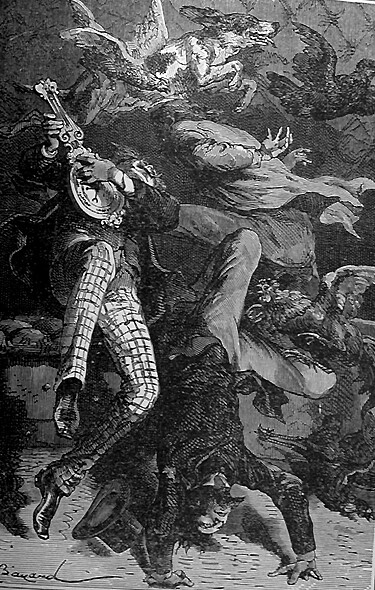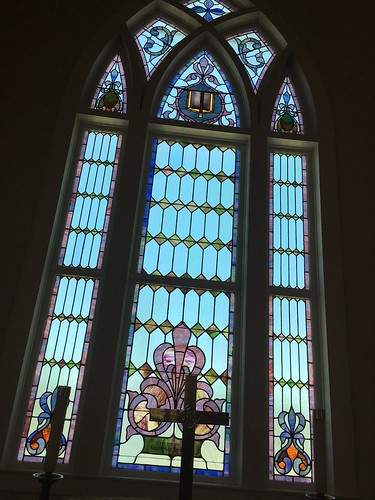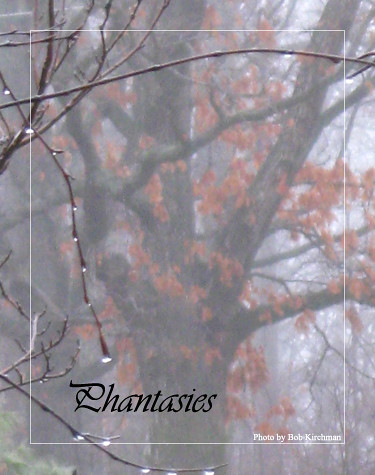
Volume XV, Issue XVII
Phantasies
By George MacDonald, Chapter 4
When bale is att hyest, boote is nyest."
~ Ballad of Sir Aldingar.
By this time, my hostess was quite anxious that I should be gone. So, with warm thanks for their hospitality, I took my leave, and went my way through the little garden towards the forest. Some of the garden flowers had wandered into the wood, and were growing here and there along the path, but the trees soon became too thick and shadowy for them. I particularly noticed some tall lilies, which grew on both sides of the way, with large dazzlingly white flowers, set off by the universal green. It was now dark enough for me to see that every flower was shining with a light of its own. Indeed it was by this light that I saw them, an internal, peculiar light, proceeding from each, and not reflected from a common source of light as in the daytime. This light sufficed only for the plant itself, and was not strong enough to cast any but the faintest shadows around it, or to illuminate any of the neighbouring objects with other than the faintest tinge of its own individual hue. From the lilies above mentioned, from the campanulas, from the foxgloves, and every bell-shaped flower, curious little figures shot up their heads, peeped at me, and drew back. They seemed to inhabit them, as snails their shells but I was sure some of them were intruders, and belonged to the gnomes or goblin-fairies, who inhabit the ground and earthy creeping plants. From the cups of Arum lilies, creatures with great heads and grotesque faces shot up like Jack- in-the-box, and made grimaces at me; or rose slowly and slily over the edge of the cup, and spouted water at me, slipping suddenly back, like those little soldier-crabs that inhabit the shells of sea-snails. Passing a row of tall thistles, I saw them crowded with little faces, which peeped every one from behind its flower, and drew back as quickly; and I heard them saying to each other, evidently intending me to hear, but the speaker always hiding behind his tuft, when I looked in his direction, "Look at him! Look at him! He has begun a story without a beginning, and it will never have any end. He! he! he! Look at him!"
But as I went further into the wood, these sights and sounds became fewer, giving way to others of a different character. A little forest of wild hyacinths was alive with exquisite creatures, who stood nearly motionless, with drooping necks, holding each by the stem of her flower, and swaying gently with it, whenever a low breath of wind swung the crowded floral belfry. In like manner, though differing of course in form and meaning, stood a group of harebells, like little angels waiting, ready, till they were wanted to go on some yet unknown message. In darker nooks, by the mossy roots of the trees, or in little tufts of grass, each dwelling in a globe of its own green light, weaving a network of grass and its shadows, glowed the glowworms.
They were just like the glowworms of our own land, for they are fairies everywhere; worms in the day, and glowworms at night, when their own can appear, and they can be themselves to others as well as themselves. But they had their enemies here. For I saw great strong-armed beetles, hurrying about with most unwieldy haste, awkward as elephant-calves, looking apparently for glowworms; for the moment a beetle espied one, through what to it was a forest of grass, or an underwood of moss, it pounced upon it, and bore it away, in spite of its feeble resistance. Wondering what their object could be, I watched one of the beetles, and then I discovered a thing I could not account for. But it is no use trying to account for things in Fairy Land; and one who travels there soon learns to forget the very idea of doing so, and takes everything as it comes; like a child, who, being in a chronic condition of wonder, is surprised at nothing. What I saw was this. Everywhere, here and there over the ground, lay little, dark-looking lumps of something more like earth than anything else, and about the size of a chestnut. The beetles hunted in couples for these; and having found one, one of them stayed to watch it, while the other hurried to find a glowworm. By signals, I presume, between them, the latter soon found his companion again: they then took the glowworm and held its luminous tail to the dark earthly pellet; when lo, it shot up into the air like a sky-rocket, seldom, however, reaching the height of the highest tree. Just like a rocket too, it burst in the air, and fell in a shower of the most gorgeously coloured sparks of every variety of hue; golden and red, and purple and green, and blue and rosy fires crossed and inter-crossed each other, beneath the shadowy heads, and between the columnar stems of the forest trees. They never used the same glowworm twice, I observed; but let him go, apparently uninjured by the use they had made of him.
In other parts, the whole of the immediately surrounding foliage was illuminated by the interwoven dances in the air of splendidly coloured fire-flies, which sped hither and thither, turned, twisted, crossed, and recrossed, entwining every complexity of intervolved motion. Here and there, whole mighty trees glowed with an emitted phosphorescent light. You could trace the very course of the great roots in the earth by the faint light that came through; and every twig, and every vein on every leaf was a streak of pale fire.
All this time, as I went through the wood, I was haunted with the feeling that other shapes, more like my own size and mien, were moving about at a little distance on all sides of me. But as yet I could discern none of them, although the moon was high enough to send a great many of her rays down between the trees, and these rays were unusually bright, and sight-giving, notwithstanding she was only a half-moon. I constantly imagined, however, that forms were visible in all directions except that to which my gaze was turned; and that they only became invisible, or resolved themselves into other woodland shapes, the moment my looks were directed towards them. However this may have been, except for this feeling of presence, the woods seemed utterly bare of anything like human companionship, although my glance often fell on some object which I fancied to be a human form; for I soon found that I was quite deceived; as, the moment I fixed my regard on it, it showed plainly that it was a bush, or a tree, or a rock.
Soon a vague sense of discomfort possessed me. With variations of relief, this gradually increased; as if some evil thing were wandering about in my neighbourhood, sometimes nearer and sometimes further off, but still approaching. The feeling continued and deepened, until all my pleasure in the shows of various kinds that everywhere betokened the presence of the merry fairies vanished by degrees, and left me full of anxiety and fear, which I was unable to associate with any definite object whatever. At length the thought crossed my mind with horror: "Can it be possible that the Ash is looking for me? or that, in his nightly wanderings, his path is gradually verging towards mine?" I comforted myself, however, by remembering that he had started quite in another direction; one that would lead him, if he kept it, far apart from me; especially as, for the last two or three hours, I had been diligently journeying eastward. I kept on my way, therefore, striving by direct effort of the will against the encroaching fear; and to this end occupying my mind, as much as I could, with other thoughts. I was so far successful that, although I was conscious, if I yielded for a moment, I should be almost overwhelmed with horror, I was yet able to walk right on for an hour or more. What I feared I could not tell. Indeed, I was left in a state of the vaguest uncertainty as regarded the nature of my enemy, and knew not the mode or object of his attacks; for, somehow or other, none of my questions had succeeded in drawing a definite answer from the dame in the cottage. How then to defend myself I knew not; nor even by what sign I might with certainty recognise the presence of my foe; for as yet this vague though powerful fear was all the indication of danger I had. To add to my distress, the clouds in the west had risen nearly to the top of the skies, and they and the moon were travelling slowly towards each other. Indeed, some of their advanced guard had already met her, and she had begun to wade through a filmy vapour that gradually deepened.
At length she was for a moment almost entirely obscured. When she shone out again, with a brilliancy increased by the contrast, I saw plainly on the path before me--from around which at this spot the trees receded, leaving a small space of green sward--the shadow of a large hand, with knotty joints and protuberances here and there. Especially I remarked, even in the midst of my fear, the bulbous points of the fingers. I looked hurriedly all around, but could see nothing from which such a shadow should fall. Now, however, that I had a direction, however undetermined, in which to project my apprehension, the very sense of danger and need of action overcame that stifling which is the worst property of fear. I reflected in a moment, that if this were indeed a shadow, it was useless to look for the object that cast it in any other direction than between the shadow and the moon. I looked, and peered, and intensified my vision, all to no purpose. I could see nothing of that kind, not even an ash-tree in the neighbourhood. Still the shadow remained; not steady, but moving to and fro, and once I saw the fingers close, and grind themselves close, like the claws of a wild animal, as if in uncontrollable longing for some anticipated prey. There seemed but one mode left of discovering the substance of this shadow. I went forward boldly, though with an inward shudder which I would not heed, to the spot where the shadow lay, threw myself on the ground, laid my head within the form of the hand, and turned my eyes towards the moon Good heavens! what did I see? I wonder that ever I arose, and that the very shadow of the hand did not hold me where I lay until fear had frozen my brain. I saw the strangest figure; vague, shadowy, almost transparent, in the central parts, and gradually deepening in substance towards the outside, until it ended in extremities capable of casting such a shadow as fell from the hand, through the awful fingers of which I now saw the moon. The hand was uplifted in the attitude of a paw about to strike its prey. But the face, which throbbed with fluctuating and pulsatory visibility--not from changes in the light it reflected, but from changes in its own conditions of reflecting power, the alterations being from within, not from without--it was horrible. I do not know how to describe it. It caused a new sensation. Just as one cannot translate a horrible odour, or a ghastly pain, or a fearful sound, into words, so I cannot describe this new form of awful hideousness. I can only try to describe something that is not it, but seems somewhat parallel to it; or at least is suggested by it. It reminded me of what I had heard of vampires; for the face resembled that of a corpse more than anything else I can think of; especially when I can conceive such a face in motion, but not suggesting any life as the source of the motion. The features were rather handsome than otherwise, except the mouth, which had scarcely a curve in it. The lips were of equal thickness; but the thickness was not at all remarkable, even although they looked slightly swollen. They seemed fixedly open, but were not wide apart. Of course I did not REMARK these lineaments at the time: I was too horrified for that. I noted them afterwards, when the form returned on my inward sight with a vividness too intense to admit of my doubting the accuracy of the reflex. But the most awful of the features were the eyes. These were alive, yet not with life.
They seemed lighted up with an infinite greed. A gnawing voracity, which devoured the devourer, seemed to be the indwelling and propelling power of the whole ghostly apparition. I lay for a few moments simply imbruted with terror; when another cloud, obscuring the moon, delivered me from the immediately paralysing effects of the presence to the vision of the object of horror, while it added the force of imagination to the power of fear within me; inasmuch as, knowing far worse cause for apprehension than before, I remained equally ignorant from what I had to defend myself, or how to take any precautions: he might be upon me in the darkness any moment. I sprang to my feet, and sped I knew not whither, only away from the spectre. I thought no longer of the path, and often narrowly escaped dashing myself against a tree, in my headlong flight of fear.
Great drops of rain began to patter on the leaves. Thunder began to mutter, then growl in the distance. I ran on. The rain fell heavier. At length the thick leaves could hold it up no longer; and, like a second firmament, they poured their torrents on the earth. I was soon drenched, but that was nothing. I came to a small swollen stream that rushed through the woods. I had a vague hope that if I crossed this stream, I should be in safety from my pursuer; but I soon found that my hope was as false as it was vague. I dashed across the stream, ascended a rising ground, and reached a more open space, where stood only great trees. Through them I directed my way, holding eastward as nearly as I could guess, but not at all certain that I was not moving in an opposite direction. My mind was just reviving a little from its extreme terror, when, suddenly, a flash of lightning, or rather a cataract of successive flashes, behind me, seemed to throw on the ground in front of me, but far more faintly than before, from the extent of the source of the light, the shadow of the same horrible hand. I sprang forward, stung to yet wilder speed; but had not run many steps before my foot slipped, and, vainly attempting to recover myself, I fell at the foot of one of the large trees. Half-stunned, I yet raised myself, and almost involuntarily looked back. All I saw was the hand within three feet of my face. But, at the same moment, I felt two large soft arms thrown round me from behind; and a voice like a woman's said: "Do not fear the goblin; he dares not hurt you now." With that, the hand was suddenly withdrawn as from a fire, and disappeared in the darkness and the rain. Overcome with the mingling of terror and joy, I lay for some time almost insensible. The first thing I remember is the sound of a voice above me, full and low, and strangely reminding me of the sound of a gentle wind amidst the leaves of a great tree. It murmured over and over again: "I may love him, I may love him; for he is a man, and I am only a beech-tree." I found I was seated on the ground, leaning against a human form, and supported still by the arms around me, which I knew to be those of a woman who must be rather above the human size, and largely proportioned. I turned my head, but without moving otherwise, for I feared lest the arms should untwine themselves; and clear, somewhat mournful eyes met mine. At least that is how they impressed me; but I could see very little of colour or outline as we sat in the dark and rainy shadow of the tree. The face seemed very lovely, and solemn from its stillness; with the aspect of one who is quite content, but waiting for something. I saw my conjecture from her arms was correct: she was above the human scale throughout, but not greatly.
Why do you call yourself a beech-tree?" I said.
Because I am one," she replied, in the same low, musical, murmuring voice.
You are a woman," I returned.
Do you think so? Am I very like a woman then?"
You are a very beautiful woman. Is it possible you should not know it?"
I am very glad you think so. I fancy I feel like a woman sometimes. I do so to-night--and always when the rain drips from my hair. For there is an old prophecy in our woods that one day we shall all be men and women like you. Do you know anything about it in your region? Shall I be very happy when I am a woman? I fear not, for it is always in nights like these that I feel like one. But I long to be a woman for all that."
I had let her talk on, for her voice was like a solution of all musical sounds. I now told her that I could hardly say whether women were happy or not. I knew one who had not been happy; and for my part, I had often longed for Fairy Land, as she now longed for the world of men. But then neither of us had lived long, and perhaps people grew happier as they grew older. Only I doubted it.
I could not help sighing. She felt the sigh, for her arms were still round me. She asked me how old I was.
Twenty-one," said I.
Why, you baby!" said she, and kissed me with the sweetest kiss of winds and odours. There was a cool faithfulness in the kiss that revived my heart wonderfully. I felt that I feared the dreadful Ash no more.
What did the horrible Ash want with me?" I said.
I am not quite sure, but I think he wants to bury you at the foot of his tree. But he shall not touch you, my child."
Are all the ash-trees as dreadful as he?"
Oh, no. They are all disagreeable selfish creatures--(what horrid men they will make, if it be true!)--but this one has a hole in his heart that nobody knows of but one or two; and he is always trying to fill it up, but he cannot. That must be what he wanted you for. I wonder if he will ever be a man. If he is, I hope they will kill him."
How kind of you to save me from him!"
I will take care that he shall not come near you again. But there are some in the wood more like me, from whom, alas! I cannot protect you. Only if you see any of them very beautiful, try to walk round them."
What then?"
I cannot tell you more. But now I must tie some of my hair about you, and then the Ash will not touch you. Here, cut some off. You men have strange cutting things about you."
She shook her long hair loose over me, never moving her arms.
I cannot cut your beautiful hair. It would be a shame."
Not cut my hair! It will have grown long enough before any is wanted again in this wild forest. Perhaps it may never be of any use again--not till I am a woman." And she sighed.
As gently as I could, I cut with a knife a long tress of flowing, dark hair, she hanging her beautiful head over me. When I had finished, she shuddered and breathed deep, as one does when an acute pain, steadfastly endured without sign of suffering, is at length relaxed. She then took the hair and tied it round me, singing a strange, sweet song, which I could not understand, but which left in me a feeling like this--
I saw thee ne'er before;
I see thee never more;
But love, and help, and pain, beautiful one,
Have made thee mine, till all my years are done."
I cannot put more of it into words. She closed her arms about me again, and went on singing. The rain in the leaves, and a light wind that had arisen, kept her song company. I was wrapt in a trance of still delight. It told me the secret of the woods, and the flowers, and the birds. At one time I felt as if I was wandering in childhood through sunny spring forests, over carpets of primroses, anemones, and little white starry things--I had almost said creatures, and finding new wonderful flowers at every turn. At another, I lay half dreaming in the hot summer noon, with a book of old tales beside me, beneath a great beech; or, in autumn, grew sad because I trod on the leaves that had sheltered me, and received their last blessing in the sweet odours of decay; or, in a winter evening, frozen still, looked up, as I went home to a warm fireside, through the netted boughs and twigs to the cold, snowy moon, with her opal zone around her. At last I had fallen asleep; for I know nothing more that passed till I found myself lying under a superb beech-tree, in the clear light of the morning, just before sunrise. Around me was a girdle of fresh beech-leaves. Alas! I brought nothing with me out of Fairy Land, but memories--memories. The great boughs of the beech hung drooping around me. At my head rose its smooth stem, with its great sweeps of curving surface that swelled like undeveloped limbs. The leaves and branches above kept on the song which had sung me asleep; only now, to my mind, it sounded like a farewell and a speedwell. I sat a long time, unwilling to go; but my unfinished story urged me on. I must act and wander. With the sun well risen, I rose, and put my arms as far as they would reach around the beech-tree, and kissed it, and said good- bye. A trembling went through the leaves; a few of the last drops of the night's rain fell from off them at my feet; and as I walked slowly away, I seemed to hear in a whisper once more the words: "I may love him, I may love him; for he is a man, and I am only a beech-tree."
(to be continued)
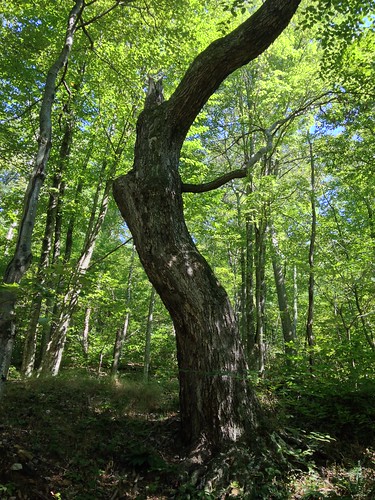
Photo by Bob Kirchman.
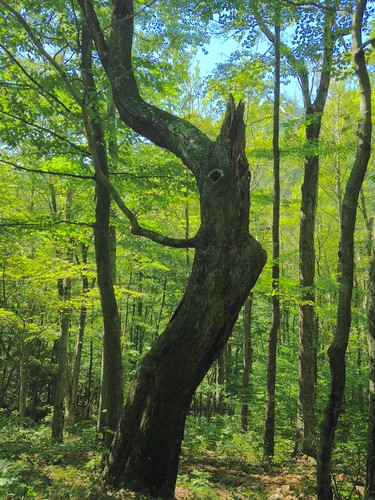
Photo by Bob Kirchman.
Looking for Artist
Who Can Walk on Water
The most creative job in the world involves fashion, decorating, recreation, education, transportation, psychology, romance, cuisine, literature, art, economics, government, pediatrics, geriatrics, entertainment, maintenance, purchasing, law, religion, energy and management. Anyone who can handle all of these has to be somebody special. She is. She’s a homemaker.” – Richard Kerr
If the work comes to the artist and says, 'Here I am, serve me,' then the job of the artist, great or small, is to serve. The amount of the artist's talent is not what it is about. Jean Rhys said to an interviewer in the Paris Review, 'Listen to me. All of writing is a huge lake. There are great rivers that feed the lake, like Tolstoy and Dostoyevsky. And there are mere trickles, like Jean Rhys. All that matters is feeding the lake. I don't matter. The lake matters. You must keep feeding the lake'.” ― Madeleine L'Engle, Walking on Water: Reflections on Faith and Art
Somewhere in my past, I owned a book of Nineteenth Century industrial illustrations. They were beautiful. Of note were the obvious details of pure ornamentation that the designers sought to put into their work. There was a sense that there was wonder to be unfolded in the inventions so delineated. Design seems to have moved sharply away from the hand-rendered transcendence of that period to a more machine-based process. There is a beautiful quality to much of that as well, but there is less direct touch to paper and process. I miss that. Still, there is a place for Divine Design. Richard Kerr’s homemaker embodies the practice of creativity. Many building designers are quite adept at assembling elements and organizing spaces on their screens, but where once they would have had creative interaction with the renderer, the press of a few buttons and the arc of the mouse take them to the visualization of their work.
This week I started to re-read Madeline L’Engle’s Walking on Water: Reflections on Faith and Art. [1.] Not far into this fine little book one encounters the topic of obedience. L’engle puts it this way: A work of art, be it a painting, a book, or any other work, comes to the artist and says: “Here I am, Enflesh me. Give Birth to me.” The artist is faced with a choice. She may respond as Mary: “My soul doth magnify the Lord,” or she may refuse. The decision is not necessarily a conscious one. And so, as I continue to provide old-fashioned visualization for a few clients, I see the work there dwindling. Yet I am not yet ready to give up serving. There is still work to be done. For the past months, I have taught drawing and painting to a young high school student who is home schooled. There is Divine purpose there. Now the invitation has been extended to teach a unit in the home school coop. It seems the Divine mission is thus: to inspire a new generation to infuse their life in this world with the stuff that Kerr talks about. Divine mission, a Sacred trust, an invitation to join the Master in His finest work. I find myself enthused.
In a very real sense not one of us is qualified, but it seems that God continually chooses the most unqualified to do his work, to bear his glory. If we are qualified, we tend to think that we have done the job ourselves. If we are forced to accept our evident lack of qualification, then there's no danger that we will confuse God's work with our own, or God's glory with our own.” -- Madeleine L'Engle, Walking on Water: Reflections on Faith and Art
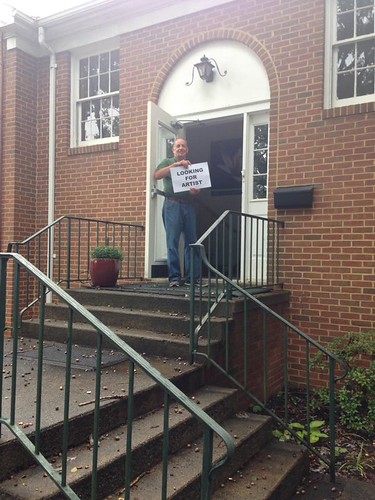
Looking for artist... Photo by Kristina Elaine Greer.

...who can walk on water! Photo by Kristina Elaine Greer.
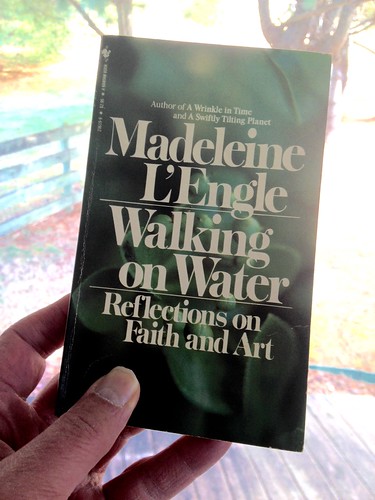
All children are artists, and it is an indictment of our culture that so many of them lose their creativity, their unfettered imaginations, as they grow older. But they start off without self-consciousness as they paint their purple flowers, their anatomically impossible people, their thunderous, sulphurous skies. They don’t worry that they may not be as good as Di Chirico or Bracque; they know intuitively that it is folly to make comparisons, and they go ahead and say what they want to say. What looks like a hat to a grownup may, to the child artist, be an elephant inside a boa constrictor.
So what happens? Why do we lose our wonderful, rackety creativity? What corrupts us?
Corrupt: another unpopular word; another important one. It’s importance first struck me when I was reading Thomas Traherne, one of my favorite seventeenth century poets and mystics. “Certainly Adam and Eve in Paradise had not more sweete and curious apprehensions of the world than when I was a child,” he wrote. Everything was new and delightful for him. The rosy glow of sunrise had in it the flaming glory of creation. The stars at night were a living, heavenly dance. He listened to the grass growing, smelled the west wind, tasted the rain, touched the grains of sand on the shore. All hi senses, his mind, his heart, were alive and in touch with being. “So that,” Trahane adds sadly, “without much ado I as corrupted, and made to learn the dirty devices of this world, which now I unlearn, and become as a little child again, that I may enter into the Kingdom of God.”
A lot of my adult life has been spent in trying to overcome this corruption, in unlearning the dirty devices of this world, which would dull our imaginations, cut away our creativity. So it is only with the conscious-unselfconsciousness of a child that I can think about theories of asthetics, of art, particularly as these touch upon my questions about life and love and God.” -- Madeleine L'Engle, Walking on Water: Reflections on Faith and Art
Il est très simple: on ne voit bien qu'avec le cœur. L'essentiel est invisible pour les yeux."
-- Antoin de St Exupery
Higher Calling
Thought from George MacDonald

Pink Ladyslipper at White Rock Falls. Photo by Bob Kirchman
If, instead of a gem or even a flower, we could cast the gift of a lovely thought into the heart of a friend, that would be giving as the angels give."
- George Macdonald
A Gift of Beauty
Warnie's Box
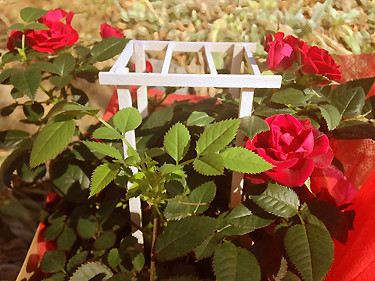
This absence of beauty, now that I come to think of it, is characteristic of our childhood. No picture on the walls of my father's house ever attracted — and indeed none deserved — our attention. We never saw a beautiful building nor imagined that a building could be beautiful. My earliest aesthetic experiences, if indeed they were aesthetic, were not of that kind; they were already incurably romantic, not formal. Once in those very early days my brother brought into the nursery the lid of a biscuit tin which he had covered with moss and garnished with twigs and flowers so as to make it a toy garden or a toy forest.
That was the first beauty I ever knew.
What the real garden had failed to do, the toy garden did. It made me aware of nature — not, indeed, as a storehouse of forms and colours but as something cool, dewy, fresh, exuberant. I do not think the impression was very important at the moment, but it soon became important in memory. As long as I live my imagination of Paradise will retain something of my brother's toy garden."
-- C. S. Lewis, Surprised by Joy [ 2.]
Fixing the Escalator
[click to read]
by Nicholas N. Eberstadt
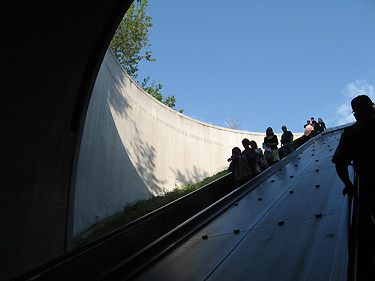
Metro Escalator, Washington, DC. Photo by Bob Kirchman
The abstraction of “inequality” doesn’t matter a lot to ordinary Americans. The reality of economic insecurity does. [3.] The Great American Escalator is broken—and it badly needs to be fixed. With the election of 2016, Americans within the bubble finally learned that the 21st century has gotten off to a very bad start in America. Welcome to the reality. We have a lot of work to do together to turn this around. (read more)
Looking for Creative Solutionists
By Bob Kirchman
Awareness of a problem is only the beginning. What if Divine Inspiration is available to lead us to new and innovative answers to human problems? It has happened in centuries past and I firmly believe it is within our grasp now.
Poll any group of young people today and you will find a degree of pessimism about the future. As the economy faltered, ‘experts’ essentially told them: “Welcome to the new normal.” But history tells us that economies are not a zero-sum game… one where someone must lose for another to win. New invention has lifted entire societies in the past and I believe it can do so again. Consider the case of Nineteenth Century England. We all know that William Wilberforce [4.] performed a great and noble work when he won the abolition of slavery, but did you know that that devastated the economy of Bristol, England’s chief slave port. Fortunes were lost. Men committed suicide. Children were cast out onto the street. Bristol’s children faced a dismal ‘new normal’ indeed.
But a young minister from Prussia came to Bristol as a missionary. George Müller [5.] saw Bristol’s street urchins as jewels to be polished. He built five large houses at Ashley Downs to care for orphans, trusting the Divine for provision. He cared for 10,024 orphan children in the course of his life, instructing the boys in trades and the ladies for work as teachers, nurses and housekeepers. He was excoriated by the ‘experts’ for training these young people ‘above their station.’ He ignored the experts. He established 117 schools which offered Christian education to over 120,000 children. But what future would there be for them?
Pastor Tim Keller calls economic development a Deaconate Ministry. To be sure the church does this work when it sends treadle sewing machines to Zambia, so that widowed ladies may become tailors. But it is also needed in the developed world. Sometimes the instrument of Divine blessing may not even know that they are. Consider the case of Isambard Kingdom Brunel, Britain’s Nineteenth Century Bridge Builder. [6.] He came to Bristol to build a suspension bridge and ended up building the Great Western Railroad, which revitalized Bristol’s economy! Brunel also designed great ships to connect Britain with the Americas, making cotton cheap and plentiful. The offshoot of this and modern textile manufacturing was that poor as well as rich could afford quality garments.
It was suggested in the Nineteenth Century that the United States Patent Office could be shut down because “everything that is going to be invented has already been invented!” Well, the truth was that much of the visionary technology depicted in Jules Verne’s Voyages Extraordinaire would not be perfected until the Twentieth Century. Only time will tell what wonders the Divine might inspire in the decades to come, but if history is any indicator, there is much to be hopeful for!
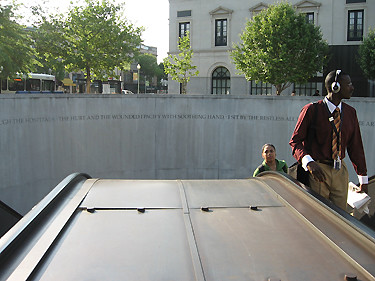
Metro Escalator, Washington, DC. Photo by Bob Kirchman
Apollo Navigation Computer
The Ministry of Teaching Art
By Bob Kirchman
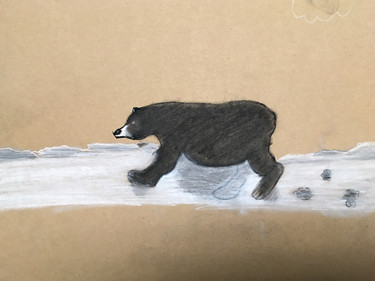
Bear by Rachel Perkins, 8th Grade.
Bezalel and Oholiab, along with everyone whom God has given the skill and know-how for making everything involved in the worship of the Sanctuary as commanded by God, are to start to work.” – Exodus 36:1
This marks the second season I have taught art with Amanda Riley at the ACE Coop in Augusta County. When I got pneumonia as a result of a reaction to a mural clear-coat I was applying, I was forced to prioritize life anew. Even in recovery my energy has been somewhat limited so I find that in addition to the obvious drive to spend time with my granddaughters, the things on top of my priorities are getting back to full speed teaching our high school and middle school studio courses. You see, I find a lot of purpose in teaching art these days. The reasons surprise me as well. These days I am not so impressed with what I can teach in the way of technique and background – though that is important. Knowledge is not the end, but rather a means toward the true end. That is allowing each student to discover that part of IMAGO DEI that drives THEM to create.
I find myself being taught by my students more than they are being taught by me. I spend less time lecturing and more time observing – ‘catching’ our students in the act of expressing that part of the Divine nature. And the class has never been so much fun! What’s more, I take great joy in the fact that my apprentices Kristina and Savhanna both are actively teaching young people now! This is a far greater joy than comes from simply being copied. The world is richer because another generation has entered the game!
The True Reason to Teach Art
This is not so much a criticism, but an observation. I do not think many of us who teach art understand the true importance of it. I think art instruction can miss the mark aiming high or low. The first type of program I will discuss certainly aims high. That is one whose goal is to produce professionals. This particular program, of necessity, is concerned with technique mastery and measurable goals. That is not a bad thing in itself, especially for those who are so motivated. In such a program it may be sometimes observed that art loses its ‘joy’ as a student becomes more proficient in technique. Furthermore, if the program stresses non-representational art, the professional opportunities may not be as widespread as the course description suggests. You might have best in show in your student exhibition only to find that you cannot sell your work in the greater community. For me, architectural rendering was a way to do art and get paid for it. Some do not consider it ‘real’ art. That is beside the point.
The other tendency is to aim low. Art is seen as part of a ‘well rounded’ curriculum, but is not pursued for its own sake at all. At university, our art faculty was constantly dogged with the expectation that they ‘contribute to a well-rounded education,’ but were always subservient to ‘academics.’ Some of us DID need to pursue professional opportunities, and so Ray Prohaska, my mentor, exhorted me to ‘get out there, work and learn stuff!’ That was probably the best advice anyone ever gave me. He had been a successful New York illustrator before his ‘retirement’ where he taught in a succession of Southern colleges. Indeed he knew that you had to take your portfolio and go knocking. Ray knew the mixture included inspiration AND perspiration, His strength as a teacher came precisely because he had been in the New York art scene, not academia, for the bulk of his career.
Ray saw something in me – not unlike the something I would see in my own mentees. That is now most instructive as I have struggled to become a teacher in my own right. Our job is not to make students in our own image. They are already made in the image of One better according to Genesis 1. Our job is to help each one of them discover the genius within them. We do that best when we watch and encourage. Yes, technique is important, but it is a tool to be given to the aspiring artist. They are like young plants that need to be nurtured – and care must be taken not to trample them. Since I have been encouraged in this direction, teaching is a lot more fun! The discoveries have been amazing! I am thankful for the opportunity to teach this way.
Most people, I have found, can do a pretty good drawing of items that they are passionate about. This is due to their self-motivated observation in these areas. That should be a springboard for introducing technique. We just looked at the life of Leonardo da Vinci and it is clear that his art fueled his inventiveness in a range of fields. The skills of observation evident in his notebooks shows us that art can be so much more than a nice ‘rounding out’ of our education – it can help us develop fundamental skills in observation and interpretation in just about any walk of life. Thus art instruction should embrace the unique individual and seek to train the hand and eye – as preparation for Divine inspiration and service. That is consistent with the belief that our service on this earth in any field can be elevated to worship.
Profession, Hobby, or Foundation for Critical Thinking
One of our graduates last year planned an important mural project during the Summer. She was somewhat apologetic about her plans to study nursing in the fall – like “if you are strong in the arts, you should pursue them as a profession.” I am actually thrilled that she sees opportunity in what should be called the HEALING ARTS. You see, if Da Vinci’s drawing skills helped him gain new insights into anatomy, why shouldn’t the modern day personification of the Renaissance person find similar insight in her own studies. So often I have seen doctors struggle to “see it” when it comes to a diagnosis. The trained eye and hand of observation could just be the edge necessary in a critical point of diagnosis! And guess what? Later in life there may be opportunity to see where the path of art leads. England’s great wartime leader Sir Winston Churchill became a very productive painter later in his life.
When Alan Bean went to the moon, he was also an artist. The mission of an astronaut is all consuming but Bean would add a critical element to our observation of the moon through his art after the Apollo Program ended. Georg Wilhelm Steller, the German botanist, zoologist, physician and explorer, who worked in Russia and is considered a pioneer of Alaskan natural history, sailed with Vitus Bering on his voyages of discovery. His drawings added much to the understanding of natural history in the newly explored region.
My point is that art can (and should) become very much a part of a person’s methodology in observation. Our training should lead us to become better observers and better imaginers to the end that we might all be better at analyzing and solving the challenges we face in our lives. Although it may indeed find fulfillment in profession or avocation, art should be seen rightfully as another tool of critical thinking.
And Moses said unto the children of Israel, See, the Lord hath called by name Bezaleel the son of Uri, the son of Hur, of the tribe of Judah; And he hath filled him with the spirit of God, in wisdom, in understanding, and in knowledge, and in all manner of workmanship; And to devise curious works, to work in gold, and in silver, and in brass, And in the cutting of stones, to set them, and in carving of wood, to make any manner of cunning work. And he hath put in his heart that he may teach, both he, and Aholiab, the son of Ahisamach, of the tribe of Dan.” – Exodus 35:30-35
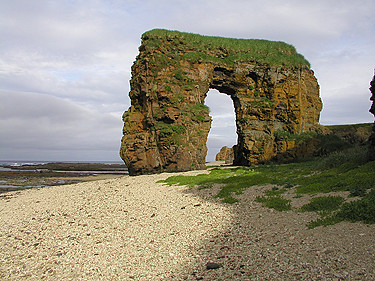
Steller’s Arch on Bering Island. Photo by Арка Стеллера.

